WORKSHEET ON SQUARE ROOT BY LONG DIVISION METHOD
Subscribe to our ▶️ YouTube channel 🔴 for the latest videos, updates, and tips.
Find the square root of each the following numbers by long division.
1) 104976
2) 962361
3) 12321
4) 2116
5) 7744
6) The value of √(0.16/0.04) is
a) 8 b) 2 c) 0.63 d) none
7) The least perfect square number which is divisible by 3, 4, 5, 6 and 8 is
a) 900 b) 120 c) 250 d) 360
8) Find the smallest number by which 5808 should be multiplied as that the product becomes a perfect square.
a) 2 b) 3 c) 7 d) 11
9) The least number by which 1470 must be divided to get a number which is perfect square.
a) 5 b) 6 c) 15 d) 30
10) √(0.081 x 0.484) / (0.0064 x 6.25) is equal to
a) 0.9 b) 0.99 c) 9 d) 99

1. Answer :
Step 1 :
Separate the digits by taking commas from right to left once in two digits.
10,49,76
When we do so, we get 10 before the first comma.
Step 2 :
Now we have to multiply a number by itself such that
the product ≤ 10
(The product must be greatest and also less than 10)
The above condition will be met by “3”.
Because 3 ⋅ 3 = 9 ≤ 10.
Now this situation is explained using long division
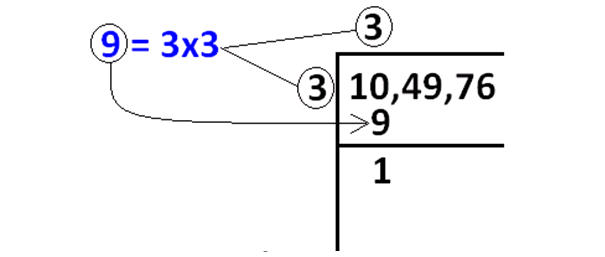
In the above picture, 9 is subtracted from 10 and we got the remainder 1.
Step 3 :
Now, we have to bring down 49 and quotient 3 to be multiplied by 2 as given in the picture below.
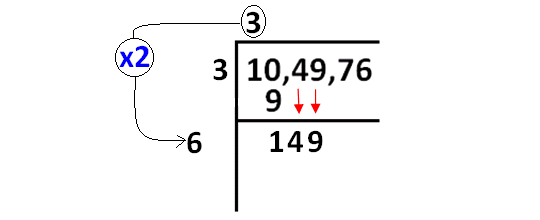
Step 4 :
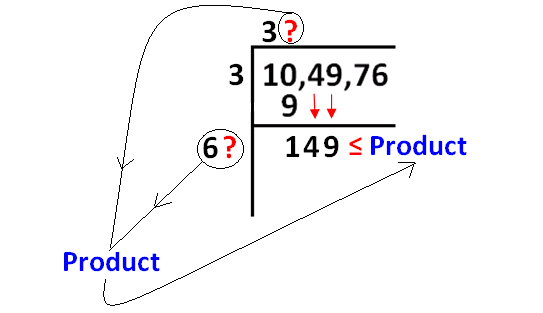
Now we have to take a same number at the two places indicated by "?".
Then, we have to find the product as shown in the picture and also the product must meet the condition as indicated.
Step 5 :
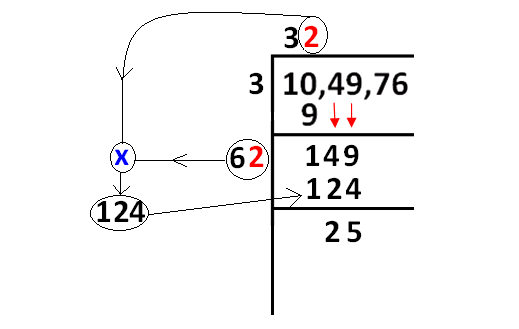
The condition said in step 4 will be met by replacing "?" with "2".
Than we have to do the calculation as given in the picture.
Step 6 :
Now, we have to bring down 76 and quotient 32 to be multiplied by 2 as given in the picture below.

Step 7 :
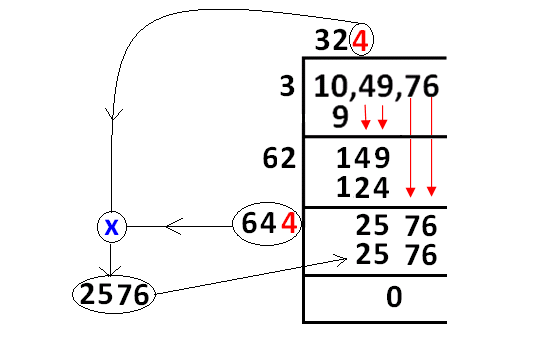
In the above picture, we have applied the procedures explained in step 4 and step 5. And we got the remainder zero.
Step 8 :
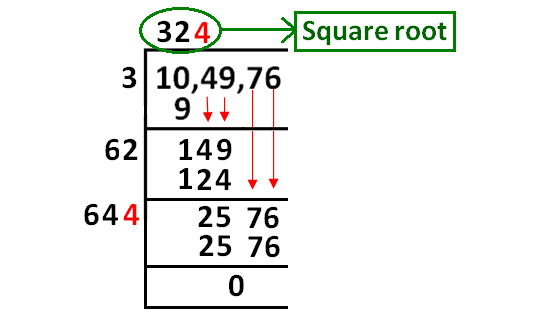
From the above picture, finally we got the square root of 104976. That is 324.
√104976 = 324
2. Answer
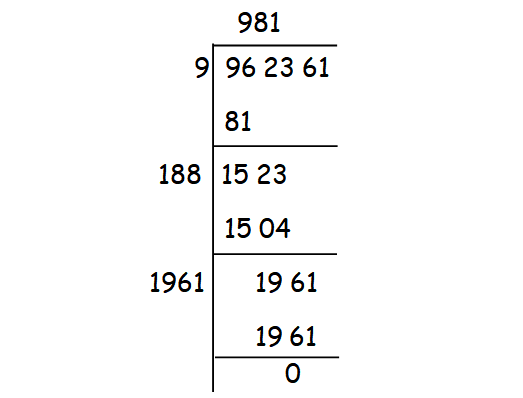
√962361 = 981
3. Answer :
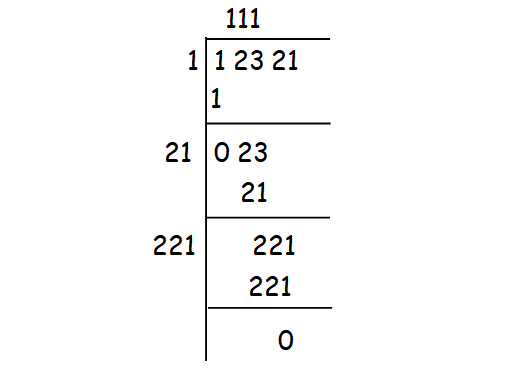
√12321 = 111
4. Answer :
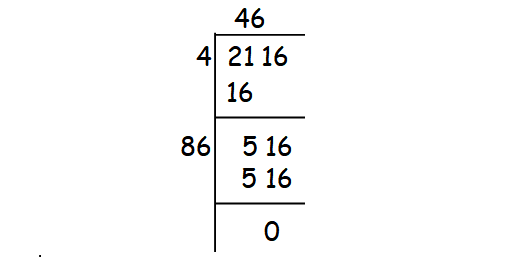
√2116 = 46
5. Answer :
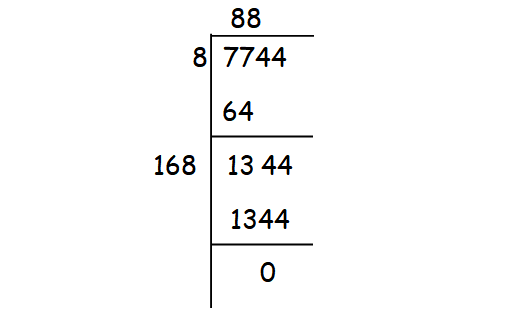
√7744 = 88
6. Answer :
√(0.16/0.04)
To get rid of the decimal, we have to multiply both numerator and denominator by 100.
= √(0.16 x 100) /(0.04 x 100)
= √(16/4)
= √4
= √(2 x 2)
= 2
7. Answer :
The product of the given numbers will not be a perfect square, in order to make it as perfect square we may have to include some numerals.
= √(3 x 4 x 5 x 6 x 8)
= √(3 x 2 x 2 x 5 x 2 x 3 x 2 x 2 x 2)
= √(3 x 2 x 2 x 5 x 2 x 3 x 2 x 2 x 2)
To make it as perfect square, we may have to include 5.
= √(3 x 2 x 2 x 5 x 2 x 3 x 2 x 2 x 2 x 5)
= 5 x 2 x 2 x 2 x 3
= 120
So, the required least number is 120.
8. Answer :
To get a small number to be multiplied, we have to decompose 5808 as product of prime factors.
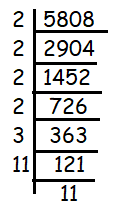
= √(2 x 2 x 2 x 2 x 3 x 11 x 11)
By observing these prime numbers, every number has pairs. While inserting one more 3, it will get its pair. Then the least number to be multiplied is 3.
So, option b is correct.
9. Answer :
1470 is not a perfect square, to make it as perfect square we have to remove some number. To find which number to be removed, we have to write it as product of prime factors and finding the extra number to be removed.
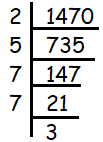
√1470 = √(2 x 5 x 7 x 7 x 3)
The numbers which doesn't have pairs are 2, 5 and 3
product of these factors = 2 x 5 x 3
= 30
30 is the number that we find extra. So, 30 is the number to be removed to make it as perfect square.
10. Answer :
√(0.081 x 0.484) / (0.0064 x 6.25) is equal to
Simplifying the numerator :
= √(0.081 x 0.484)
Multiplying and dividing each number by 1000.
= √(81/1000) x (484/1000)
√( 9 x 9) x (22 x 22) / (1000 x 1000) ----(1)
Simplifying the denominator :
= (0.0064 x 6.25)
Multiplying and dividing 0.0064 by 10000 and multiplying and dividing 6.25 by 100, we get
= √(64/10000) x (625/100)
√(8 x 8) x (25 x 25) / (100 x 100 x 10 x 10) -----(2)
(1) / (2)
= √( 9 x 9) x (22 x 22) / (1000 x 1000) /(8 x 8) x (25 x 25)/(1000 x 1000)
= (9 x 22) / (8 x 25)
= 0.99
So, option b is correct.
Subscribe to our ▶️ YouTube channel 🔴 for the latest videos, updates, and tips.
Kindly mail your feedback to v4formath@gmail.com
We always appreciate your feedback.
About Us | Contact Us | Privacy Policy
©All rights reserved. onlinemath4all.com

Recent Articles
-
Digital SAT Math Problems and Solutions (Part - 31)
Mar 02, 26 08:36 AM
Digital SAT Math Problems and Solutions (Part - 31) -
Digital SAT Math Problems and Solutions (Part - 30)
Mar 02, 26 08:11 AM
Digital SAT Math Problems and Solutions (Part - 30) -
Digital SAT Math Problems and Solutions (Part - 29)
Mar 01, 26 07:26 PM
Digital SAT Math Problems and Solutions (Part - 29)


